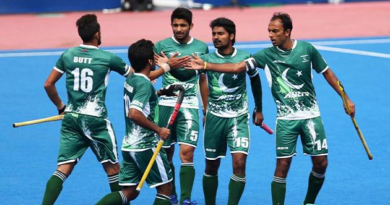Hockey Passion Exclusive Delivering Peak Performance Across 8 Games in 2 Weeks in Olympics is a Challenge: Felix Denayer
Felix Denayer has been a great servant of Belgium hockey (at the club level as well as the international level). The midfield mainstay of the Belgium men’s hockey team have been instrumental in several success stories crafted by the Red Lions on the international hockey stage. The world’s 7th most capped men’s hockey player (402 caps) had captained Belgium to glory at the 2021 Tokyo Olympics and was also part of the national side winning the 2018 World Cup in India.
The 34-year-old, who played all his club hockey for KHC Dragons, called time on his international career after Belgium’s rather disappointing quarterfinal exit at the 2024 Paris Olympics. The soft-spoken, demure midfielder is the co-founder of Naked Hockey – a firm that is into selling hockey sticks, shin guards, gloves, penalty corner protection equipment, all forms of sports apparel, etc. Denayer, who made his senior international debut at the Mayor Radhakrishnan Stadium in Chennai, during the January 2008 Five Test Series against India, spoke to Hockey Passion in an exclusive interview.
Excerpts:
Q You have featured in 5 Olympics in an international career spanning 16 years – you are the world’s 7th most capped men’s hockey player. What would you attribute to this amazing hockey career?
It’s been an incredible journey. I’ve been lucky that I have managed to stay free from major injuries during my sixteen year international career and for this I must give credit to the Royal Belgian Hockey Association for putting in place a structured programme that focuses not just on providing younger players a platform to develop and perform at their peak, but also on various aspects behind the scenes such as injury prevention, tracking of players, collecting data, etc and all that have surely contributed to my international hockey longevity.
Q Belgium was not talked about as a top side twenty years back as they are now alongside the likes of the Netherlands, Germany, and Australia. Can you talk us through Belgium’s resurgence in world hockey that saw them winning the 2018 World Cup and 2021 Tokyo Olympics gold?
I think qualifying for the 2008 Beijing Olympics was a turning point of Belgium hockey as we made it to the Olympics after a hiatus of 32 years (we last played at the 1976 Montreal Olympics). Our federation ensured we build on the momentum of playing in the 2008 Olympics and never looked back as our federation adhered to a well-planned programme that started to yield results. We did not have a generation in front of us, who could tell us what we needed to do. We had to deep dive, reinvent ourselves and keep asking ourselves questions, where we wanted to go, what we wanted to achieve, and there was a lot of learning along the way. We had a dream to be a top hockey side and slowly and steadily we realized that ambition.
Q How has international hockey evolved over the years?
Hockey has changed for sure and become much faster. Countries that are developing a full-time programme have a competitive edge. Hockey was earlier probably more based on talent but now it is a combination of a lot of different factors – you have to have a certain talent but the challenge lies in winning a big tournament such as Olympics, wherein you have to perform on all those 8 games across two weeks something not many people talk about. Playing one game is quite intensive for the body – so, how do you recover and ensure you are playing best hockey for all those 8 games. Our programme aims to create good players, who can play everywhere on the turf. A forward should be able to adapt to playing in defence and in midfield – similarly, a defender can adapt in midfield or in the forwardline. The beauty of hockey is that it is very dynamic, very physical, and very technical and the beauty of team sport is that everyone is different and it is nice when it clicks.
Q Different teams employ diverse playing styles in international hockey. What’s your take on European hockey and Asian hockey?
European hockey and Asian hockey are an ‘exciting and nice clash of cultures’ in international hockey. European hockey is more structured, tactical, and zonal and we value basic skills to be able to play as a group and not as individuals. Asian hockey is all about speed, a bit of chaos. Players from Asia have great hands – Indian players not just have great hands as well as incredible basic skills. So when we play Asians team coaches tell us not to playing within the physical space of their players because their hands are so good. We are used to teams that indulge in passing play, but when it comes to Indian players or for that matter Asian hockey, it totally different as they are very technical, have good hands, body feints, etc. As a young kid I remember watching an India-Pakistan match in Europe and it was really a different and thrilling experience to see these teams in front of passionate spectators. Both cultures are always learning from each other – for example, we also get influences from Asian nations, Australia or New Zealand.
Q How do see hockey as a commercial viable product?
The popularity of hockey is growing all the time. It is played across the globe by men and women. Hockey as a product has a lot to offer since it is attractive to watch and a lot of goals are scored. The challenge for the world hockey fraternity is to translate the ‘popularity and sell’ hockey as a product better. The popularity of the sport is yet to matched by its commercial viability. The objective should be to make hockey attractive for all. I’m sure efforts are underway to make hockey a commercially strong product.
Q You have featured in the Champions Trophy, Hockey World League and Pro League – how different has been the experience playing across all these varied formats?
Historically, Belgium have not been regularly past of the Champions Trophy. We always accorded top priority to Champions Trophy as we felt that playing in this tournament was in line with our objective to be among the top eight sides in the world after we qualified for the 2008 Olympics. The general line of thought was that we needed to be challenged by the best. You may not win against these top sides but you are going to learnt a lot playing against them. We had first played our Champions Trophy at Melbourne in 2012. Hockey World League replaced the Champions Trophy and now we have the Pro League. I really enjoyed the inaugural edition of the Pro League in 2019 because I could travel to so many countries. I did not like the concept of mini tournaments because it took the home and away crowd support. For example, if Belgium is playing Germany in Argentina, home crowd support is not there – however, I understand that playing the 2019 format must have been challenging budget-wise.
Q The Indian men’s team have bagged back-to-back Olympic bronze medals – how do you see the upswing in fortunes for the Blueshirts?
India have a rich hockey legacy and it’s always hard to compete with history. And because India have a big heritage there is always a bit of pressure that comes with it. The platform Indian hockey has been built in recent years is very interesting to see. Back-to-back Olympic bronze medals are fantastic for Indian hockey. I think they have been sticking to their identity and structure and staying consistent. Of course, India’s full-time programme is paying off.
Q How do you see the Indian men’s team become the world number one side one day?
Consistency would be the key – something the Indian hockey is building on for years and results of last two Olympics are there for all to see. Look at us, it took 32 years to qualify for the Olympics in 2008 and then it took us 16 more years to be world number one – it is about so many parts clicking at the right moment and that is the beauty of sport – you are chasing perfection and you might catch excellence at certain moments.
The biggest strength of Indian hockey is that they have such a big pool. Of course, structuring such a pool is never easy. If India can structure their pool it would generate talent across every generation – the challenge would be to consistently create those world-class talents. India surely have the recipe to be a world number one at a certain point.




